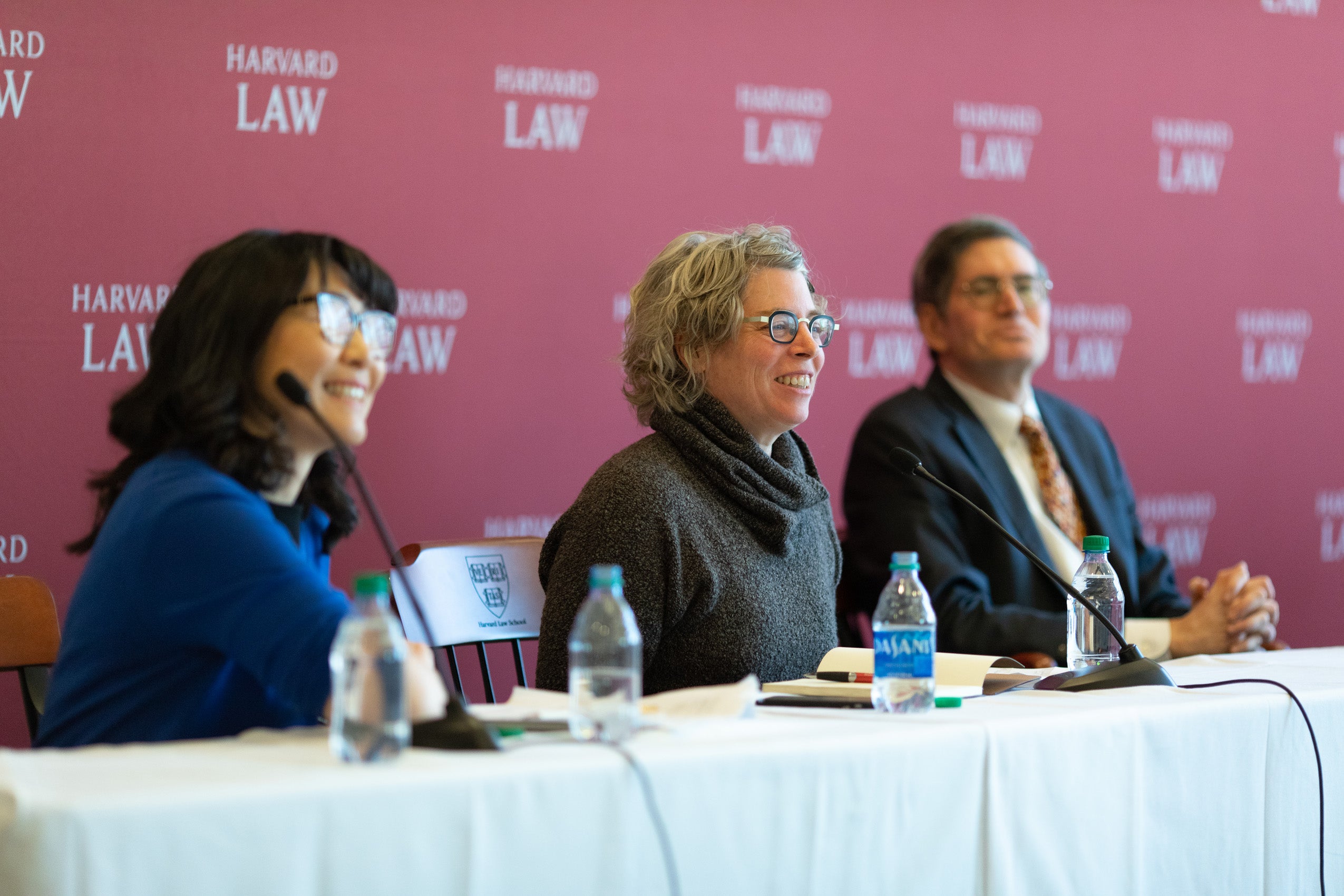People
Jill Lepore
-
An op-ed by Nancy Gertner: In November 2018, when then-president Donald Trump challenged a federal judge’s impartiality by calling him an “Obama judge,” Supreme Court…
-
President Warren G. Harding was in danger of facing criminal charges in 1921 in the Teapot Dome bribery scandal, but he died in office first.
-
What the January 6th Report Is Missing
January 9, 2023
An article by Jill Lepore: The Government Publishing Office’s eight-hundred-and-forty-five-page report of the Select Committee to Investigate the January 6th Attack on the United States…
-
Facebook and the problem of truth
December 15, 2022
In a new podcast, Harvard Law Professors Jonathan Zittrain and Jill Lepore road-test an idea to enlist high school students across the country as “advertisement juries.”
-
The Case Against the Twitter Apology
November 14, 2022
An article written by Jill Lepore: Whose P.R.-purposed apology was worse? Al Franken’s or Louis C.K.’s? The Equifax C.E.O.’s (for a cybersecurity breach) or Papa…
-
Trial by Teenager, Part 2
November 10, 2022
The fact-checking experiment gets scaled up with 40 students in two states. The Super Bowl of fact-checking, a final test of an idea that might…
-
The Tree Branch from The Last Archive
November 10, 2022
On this episode of her American history podcast The Last Archive, Noah Feldman’s colleague Jill Lepore offers an alternate history. What would the world might…
-
The Last Archive
November 10, 2022
Trial by Teenager, Part 1: What if there were a way to stop politicians from lying on social media? Jill Lepore heads to a local…
-
As threats, misinformation and polarization spread, what is the future of democracy?
November 1, 2022
With elections still a week away, more than 100 lawsuits have already been filed targeting mail-in voting, early voting, voting machines, registration, access for partisan…
-
The United States’ Unamendable Constitution
October 26, 2022
An article by Jill Lepore: When the U.S. Constitution was written, in 1787, it was a startling political novelty, even in an age of constitution-making. Before…
-
Why the School Wars Still Rage
March 16, 2022
An article written by Jill Lepore: In 1925, Lela V. Scopes, twenty-eight, was turned down for a job teaching mathematics at a high school in Paducah, Kentucky, her home town. She had taught in the Paducah schools before going to Lexington to finish college at the University of Kentucky. But that summer her younger brother, John T. Scopes, was set to be tried for the crime of teaching evolution in a high-school biology class in Dayton, Tennessee, in violation of state law, and Lela Scopes had refused to denounce either her kin or Charles Darwin. It didn’t matter that evolution doesn’t ordinarily come up in an algebra class. And it didn’t matter that Kentucky’s own anti-evolution law had been defeated. “Miss Scopes loses her post because she is in sympathy with her brother’s stand,” the Times reported.
-
The Elephant Suit
November 16, 2021
An article by Jill Lepore: The subject of the most important animal-rights case of the 21st century was born in Thailand during the Vietnam War. Very soon after that, a tousle-haired baby, she became trapped in human history. She was captured, locked in a cage, trucked to the coast, and loaded onto a roaring 747 that soared across the Pacific until it made landfall in the United States. She spent her earliest years in Florida, not far from Disney World, before she was shipped to Texas. In 1977, when she was 5 or 6, more men hauled her onto another truck and shipped her to New York, to a spot about four miles north of Yankee Stadium: the Bronx Zoo. In the wild, barely weaned, she’d have been living with her family—her sisters, her cousins, her aunts, and her mother—touching and nuzzling and rubbing and smelling and calling to each other almost constantly. Instead, after she landed at the zoo and for years after, she gave rides to the schoolchildren of New York and performed tricks, sometimes wearing a blue-and-black polka-dotted dress. Today, in her 50s and retired, she lives alone in a one-acre enclosure in a bleak, bamboo-shrouded Bronx Zoo exhibit called, without irony, “Wild Asia.”
-
Elon Musk: The Evening Rocket
November 1, 2021
Elon Musk’s visions of the future all stem from the same place: the science-fiction he grew up on. To understand where Musk wants to take the rest of us — with his electric cars, his rockets to Mars, his meme stocks, and tunnels deep beneath the earth — Harvard professor and New Yorker writer Jill Lepore looks at those science fiction stories and helps us understand what he’s Musk missed about them. The Evening Rocket explores Musk’s strange new kind of extravagant, extreme capitalism — call it Muskism — where stock prices are driven by earnings, and also by fantasies.
-
When Black History Is Unearthed, Who Gets to Speak for the Dead?
September 28, 2021
An article by Jill Lepore: When Deidre Barnes was a kid in North Carolina, horsing around in the back seat of the car with her little brother, her grandfather drove by the woods in a white neighborhood in Durham. “You got cousins up in there,” he called back from the driver’s seat, nodding at a stand of loblolly pines in a tangle of kudzu. Barnes and her brother exchanged wide-eyed glances: they had cousins who were wild people? Only later, looking hard, did they spy a headstone: “Oh, it’s a cemetery.” A few years ago, Barnes read in the newspaper that the place was called Geer. “My grandmother’s maiden name is Geer,” she told me. “And so I asked her, ‘Do we have people buried there?’ ” I met Barnes at the cemetery on a warm, cicada night, with Debra Gonzalez-Garcia, the president of the Friends of Geer Cemetery.
-
The Inner Front
May 18, 2021
A podcast by Jill Lepore: During World War II, Nazi radio broadcast the voice of an American woman who came to be known as Axis Sally. She spoke, via shortwave radio, to American women, attempting to turn them against their country and the American war effort.
-
The Last Archive: The Rise Of Doubt
May 6, 2021
In this era of misinformation, and claims of "fake news," the truth is essential — and in question. Noted historian Jill Lepore joins us to talk about the second season of her podcast "The Last Archive," which tracks the rise of doubt through the last 100 years of American history. Lepore is also a Harvard professor, author, and staff writer at The New Yorker.
-
When Constitutions Took Over the World
March 22, 2021
An essay by Jill Lepore: In 1947, Kurt Gödel, Albert Einstein, and Oskar Morgenstern drove from Princeton to Trenton in Morgenstern’s car. The three men, who’d fled Nazi Europe and become close friends at the Institute for Advanced Study, were on their way to a courthouse where Gödel, an Austrian exile, was scheduled to take the U.S.-citizenship exam, something his two friends had done already. Morgenstern had founded game theory, Einstein had founded the theory of relativity, and Gödel, the greatest logician since Aristotle, had revolutionized mathematics and philosophy with his incompleteness theorems. Morgenstern drove. Gödel sat in the back. Einstein, up front with Morgenstern, turned around and said, teasing, “Now, Gödel, are you really well prepared for this examination?” Gödel looked stricken. To prepare for his citizenship test, knowing that he’d be asked questions about the U.S. Constitution, Gödel had dedicated himself to the study of American history and constitutional law. Time and again, he’d phoned Morgenstern with rising panic about the exam. (Gödel, a paranoid recluse who later died of starvation, used the telephone to speak with people even when they were in the same room.) Morgenstern reassured him that “at most they might ask what sort of government we have.” But Gödel only grew more upset.
-
Experts trace the history of the Equal Rights Amendment
March 13, 2020
To commemorate International Women’s Day, a team of experts met at Harvard Law School on March 9 to trace the history of the Equal Rights Amendment to date, and to argue for its importance going forward.
-
The Challenge of Preserving the Historical Record of #MeToo
March 12, 2019
Around the height of the #MeToo revelations, in the fall of 2017, I interviewed an archivist at a prominent research library for a piece about social-media preservation. It quickly became apparent that he knew less about the subject than I did; he saved Facebook posts by painstakingly copying and pasting them into Word, comment by comment, and manually pressing print. ... The notion that the memory of #MeToo needs preserving—both because it matters and because it could disappear—is also the premise of a much larger archival effort. In June, the Schlesinger Library at Harvard University’s Radcliffe Institute, arguably the paramount repository of works on American feminism, announced its intention to collect the millions of tweets and hundreds of thousands of Web pages—news articles, legislation, changing H.R. policies, public apologies—that composed #MeToo and remain as its evidence. (Harvard faculty members of the steering committee for the #MeToo project include Jill Lepore, a staff writer for this magazine, and Jeannie Suk Gersen, a contributing writer.)
-
Why I Changed My Mind
March 8, 2019
A panel discussion at HLS brought together four faculty members to share their moments of reckoning, when they had to re-examine some of their most closely held ideas.


